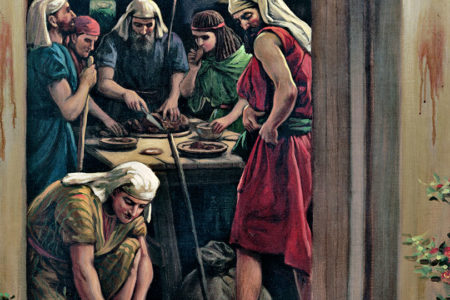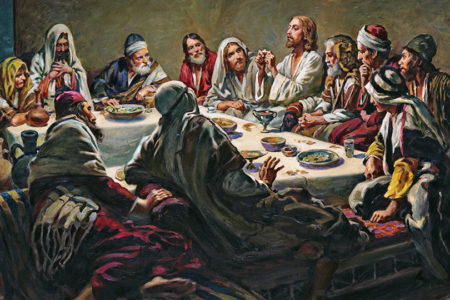The Grace of God Part Three
God’s grace is evident throughout Scripture. The previous article presented examples of that grace. This article will continue that study.
Old Testament Examples of God’s Grace
The cry for God’s grace by the godly people of the southern kingdom of Judah when the Assyrians attacked. “O Lᴏʀᴅ, be gracious to us; we have waited for You. Be their arm every morning, our salvation also in the time of trouble” (Isa. 33:2).
God’s grace for all the people of Israel threatened by Assyria. King Hezekiah of Judah sent the following exhortation to everyone in the northern kingdom of Israel, southern kingdom of Judah, and the tribes of Ephraim and Manasseh when they were threatened by Assyria:
Children of Israel, return to the Lᴏʀᴅ God of Abraham, Isaac, and Israel; then He will return to the remnant of you who have escaped from the hand of the kings of Assyria. And do not be like your fathers and your brethren, who trespassed against the Lᴏʀᴅ God of their fathers, so that He gave them up to desolation, as you see. Now do not be stiff-necked, as your fathers were, but yield yourselves to the Lᴏʀᴅ; and enter His sanctuary, which He has sanctified forever, and serve the Lᴏʀᴅ your God, that the fierceness of His wrath may turn away from you. For if you return to the Lᴏʀᴅ, your brethren and your children will be treated with compassion by those who lead them captive, so that they may come back to this land; for the Lᴏʀᴅ your God is gracious and merciful, and will not turn His face from you if you return to Him (2 Chr. 30:6–9).
God’s grace for the Israelites who were not killed by the Assyrians and Babylonians but were scattered from their homeland. “Thus says the Lᴏʀᴅ: ‘The people who survived the sword found grace in the wilderness—Israel, when I went to give him rest’” (Jer. 31:2).
God’s grace for the Israelites who returned to their homeland from their captivity in Babylon. Ezra, a priest and scribe of the Law of Moses, traveled to Israel after Israel’s captivity ended. He declared,
And now for a little while grace has been shown from the Lᴏʀᴅ our God, to leave us a remnant to escape, and to give us a peg in His holy place, that our God may enlighten our eyes and give us a measure of revival in our bondage (Ezra 9:8).
God’s grace for the fathers and people of Israel. Levites who returned home from captivity rehearsed God’s gracious response to their ancestors’ rebellion against Him after He brought them out of Egypt:
Our fathers acted proudly, hardened their necks, and did not heed Your commandments. They refused to obey, and they were not mindful of Your wonders that You did among them. But they hardened their necks, and in their rebellion they appointed a leader to return to their bondage. But You are God, ready to pardon, gracious and merciful, slow to anger, abundant in kindness, and did not forsake them (Neh. 9:16–17).
The Levites also reminded God of His gracious response to the rebellion of the Israelites who lived in their Promised Land for several centuries:
Yet for many years You had patience with them, and testified against them by Your Spirit in Your prophets. Yet they would not listen; therefore You gave them into the hand of the peoples of the lands. Nevertheless in Your great mercy You did not utterly consume them nor forsake them; for You are God, gracious and merciful (vv. 30–31).
God’s grace for the people of Nineveh. Because God forgave the people of Nineveh when they repented of their evil, Jonah was exceedingly displeased and angry (Jon. 4:1). So he prayed:
Ah, Lᴏʀᴅ, was not this what I said when I was still in my country? Therefore I fled previously to Tarshish; for I know that You are a gracious and merciful God, slow to anger and abundant in lovingkindness, One who relents from doing harm (v. 2).
God’s grace for David. King David wrote, “The Lᴏʀᴅ is merciful and gracious, slow to anger, and abounding in mercy” (Ps. 103:8). “The Lᴏʀᴅ is gracious and full of compassion, slow to anger and great in mercy” (145:8).
When proud people rose against David and a mob of violent men tried to kill him, David placed his trust in God, who is “full of compassion, and gracious” (86:14–15).
God’s grace for people of Israel willing to repent of their rebellion against God. God said the following when He was threatening to bring a massive, devastating army against the people of Israel because of their persistent rebellion against Him:
“Now, therefore,” says the Lᴏʀᴅ, “turn to Me with all your heart, with fasting, with weeping, and with mourning.” So rend your heart, and not your garments; return to the Lᴏʀᴅ your God, for He is gracious and merciful, slow to anger, and of great kindness; and He relents from doing harm (Joel 2:12–13).
God’s grace for people of the northern kingdom of Israel willing to repent of their self-centered, luxurious, abusive, immoral, covenant-breaking lifestyle. When Israel was at peace and prosperous, and the wealthy were building expensive homes, abusing the poor, using slaves, having immoral relationships, and breaking Israel’s covenant with God by worshiping images of golden calves:
Seek good and not evil, that you may live; so the Lᴏʀᴅ God of hosts will be with you, as you have spoken. Hate evil, love good; establish justice in the gate. It may be that the Lᴏʀᴅ God of hosts will be gracious to the remnant of Joseph (Amos 5:14–15).
God’s grace for the people of Israel at the end of the seven-year Tribulation, when they turn to their Messiah and are reconciled to Him. The armed forces of all the nations of the world will come against Israel near the end of the Tribulation (Zech. 12:1–8; Rev. 16:12–16). At that time, two thirds of the people of Israel living in their homeland will perish (Zech. 13:8).
The remaining third will be surrounded and attacked in Jerusalem (14:2). With their backs to the wall and every nation trying to eliminate them, the Jewish people will realize their only hope of survival is God. They will plead with Him to send their Messiah. (See Matthew 23:37–39.) Then God will go to war against the nations and fight for His beloved Israel (Zech. 12:8–9; 14:3).
To rescue them, He will send the glorified, resurrected Jesus Christ, with the wounds of His crucifixion still in His body:
And I will pour on the house of David and on the inhabitants of Jerusalem the Spirit of grace and supplication; then they will look on Me whom they pierced. Yes, they will mourn for Him as one mourns for his only son, and grieve for Him as one grieves for a firstborn. In that day there shall be a great mourning in Jerusalem,…and the land shall mourn, every family by itself (12:10–12).
Then “a fountain shall be opened for the house of David and for the inhabitants of Jerusalem, for sin and for uncleanness” (13:1). And God “will say, ‘This is My people’; and each one will say, ‘The Lᴏʀᴅ is my God’” (v. 9).
Christ will descend to the Mount of Olives in His Second Coming (Zech. 14:3–4), and a plague will strike “all the people who fought against Jerusalem” (v. 12; cf. Rev. 19:11–21). Then He shall restore God’s theocratic Kingdom and reign as God’s appointed King over the earth for the last 1,000 years of its existence (Zech. 14:9, 16–21; Rev. 20:1–6).
God’s offer of grace to the people of Israel who lived in their homeland during the first century after their captivity in Babylon and completion of the nation’s second Temple.1 It was a time of great spiritual and moral decline. The priests and people alike questioned God’s love and His covenant promises to Israel. They wondered if it did any good to serve Him.
The priests and people violated the Mosaic Law; despised God’s name; disrespected, resented, and dishonored Him; offered defective sacrifices; failed to give tithes and offerings; oppressed the poor; divorced wives; married pagans; and indulged in illicit sexual relationships.
In light of these deplorable conditions, God sent the following message to the Israelites through the prophet Malachi:
“But now entreat God’s favor, that He may be gracious to us. While this is being done by your hands, will He accept you favorably?” says the Lᴏʀᴅ of hosts (Mal.1:9).
Random expressions of God’s grace. “The Lᴏʀᴅ will give grace and glory; no good thing will He withhold from those who walk uprightly” (Ps. 84:11). “The Lᴏʀᴅ is gracious and full of compassion” (111:4). “Gracious is the Lᴏʀᴅ, and righteous; yes, our God is merciful” (116:5).
Psalm 77 describes the turmoil of a person who is so convinced he cannot be delivered from a trying situation that he asks, “Has God forgotten to be gracious?Has He in anger shut up His tender mercies?” (v. 9). A father tells his son God “gives grace to the humble” (Prov. 3:34).
ENDNOTE
- Craig A. Blaising, “Malachi,” The Bible Knowledge Commentary, ed. John F. Walvoord and Roy B. Zuck (Wheaton, IL: Victor Books, 1985), 1:1573.







